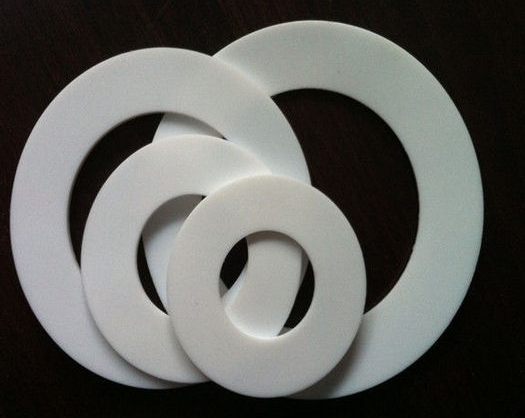- 13
- Nov
PTFE gasket
PTFE gasket
PTFE gaskets have excellent properties of creep resistance, cold flow resistance, ultra-low temperature resistance, no pollution, and easy installation and disassembly. Under a small pre-tightening force, it can withstand considerable internal pressure even in a pressure fluctuation environment. It is very suitable for rough or unevenly worn and fragile glass-faced flanges and temperature-changing sealing occasions. We can choose Gore, Klinger, Garlock, Sealon and other expanded PTFE sheets for customers to produce the required gaskets for customers.
uru
Nnukwu nguzogide okpomọkụ-okpomọkụ ọrụ nwere ike iru 250 ℃.
Obere okpomọkụ na-eguzogide-nwere ezigbo igwe siri ike; ọbụlagodi ma ọ bụrụ na ọnọdụ okpomọkụ agbada -196 ℃, ọ nwere ike idobe 5% ịgbatị.
Nguzogide corrosion-Ọ naghị emetụta ọtụtụ kemịkal na ihe mgbaze, ọ nwere ike iguzogide acid siri ike na alkalis, mmiri na ihe mgbaze ihe dị iche iche.
Weather resistance-has excellent aging life in plastics.
High lubrication-is the low coefficient of friction in solid materials.
Non-adhesion-it means that the surface tension in the solid material is small and does not adhere to any substance. Its mechanical properties have a very small friction coefficient, which is only 1/5 of that of polyethylene. This is an important feature of the perfluorocarbon surface. In addition, because the fluorine-carbon chain intermolecular forces are extremely low, PTFE is non-sticky.
Non-toxic and harmful-with physiological inertia, as an artificial blood vessel and organ implanted in the body for a long time without adverse reactions.
Ngwongwo eletriki Polytetrafluoroethylene nwere obere ọnya ọkụ dielectric na ọnwụ dielectric n’ogologo oge, yana nwere nnukwu mgbada, ike resistivity na iguzogide arc.
Radiation resistance Polytetrafluoroethylene has poor radiation resistance (104 rad), and it degrades after being exposed to high-energy radiation, and the electrical and mechanical properties of the polymer are significantly reduced. Application Polytetrafluoroethylene can be formed by compression or extrusion processing; it can also be made into water dispersion for coating, dipping or making fibers. PTFE is widely used as high and low temperature resistant, corrosion resistant materials, insulating materials, anti-stick coatings, etc. in nuclear energy, aerospace, electronics, electrical, chemical, machinery, instruments, meters, construction, textiles, food and other industries.
Nguzogide ịka nká nke ikuku: nguzogide radieshon na obere ohere: ikpughe ogologo oge na ikuku, elu na arụmọrụ anaghị agbanwe agbanwe.
Enweghị ọkụ: Ndepụta oke ikuku oxygen dị n’okpuru 90.
Nguzogide acid na alkali: anaghị agbaze na acid siri ike, alkalis siri ike na ihe mgbaze organic.
Nguzogide oxidation: na -eguzogide corrosion site na nnukwu oxidants.
Acidity: Nnọpụiche.
Ngwongwo igwe nke PTFE dị nro. Nwere ume dị elu nke ukwuu.
Polytetrafluoroethylene (F4, PTFE) has a series of excellent performance: high temperature resistance-long-term use temperature of 200~260 degrees, low temperature resistance-still soft at -100 degrees; corrosion resistance-resistance to aqua regia and all organic solvents; Weather resistance-aging life in plastics; high lubrication-with a small coefficient of friction (0.04) in plastics; non-stickiness-with low surface tension in solid materials without adhesion of any substances; non-toxic-with physiological inertness; excellent electrical properties , Is an ideal C-level insulating material.

